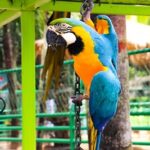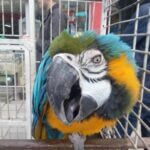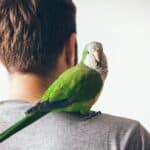Last Updated on March 3, 2024 by Carrie Stephens
You’ll feel concerned if a parrot stops talking or refuses to speak. That said, it’s unlikely the parrot has permanently lost its voice. Usually, following adjustments, the parrot will speak again.
A parrot that has stopped talking is likely afraid, unwell, depressed, or adjusting to change.
Abnormal silence or strained noises signify something is affecting the lungs, throat, or syrinx. Aspergillosis and bronchitis can make vocalization highly uncomfortable or impossible.
Parrot Not Talking Anymore
Parrots that suddenly stop making noise are usually unhappy, but it can be due to sickness.
Here are some reasons why a parrot will stop vocalizing:
- Lack of interaction. Not talking and interacting with the parrot.
- Is the parrot bored? Provide more things to do, like toys, swings, ladders, etc.
- The cage is too small. Get a spacious cage with more freedom to move.
- Some parrots dislike being alone and need same-species companions.
- Feeling unsafe due to the presence of predatory pets, like cats.
- Natural sunlight. UV rays are required for mental wellness and vitamin D3 synthesis.
- Sedentary lifestyle. Provide regular exercise and out-of-cage time in a parrot-safe room.
- Have you redecorated? Colors like red and orange signify danger to parrots.
Adjustment Period
Parrots need time to adjust to a new home or changes in their environment. Small changes, like moving the cage to a different corner, can lead to a silent period.
A vocal parrot can become quiet when introduced to a new environment. The same applies if you bring a new pet or person into your home because it’s trying to deal with change.
Even small, seemingly insignificant changes can unsettle a parrot, leading to days of near-silence.

Fear And Anxiety
Parrots are prey animals, so they instinctively freeze or attempt to flee when afraid. Captive parrots can’t fly away, so they may stand still and become silent until the danger has passed.
Not everything that bothers parrots poses a danger to their lives. This means that a parrot may stop talking when bothered by one or more of the following:
- A loud TV or music on the radio.
- The neighbor’s cat appears near the window.
- Construction work outside.
- A sudden flash of light from a passing car.
- A loud bang, like a dropping pan.
- Storms (thunder and lightning).
- An argument between two people.
Illness And Disease
A decrease or ceasing of vocalizations is a dramatic behavioral change because birds are communicative animals. It indicates they’re feeling unwell because parrots stop talking when under the weather.
They must devote more energy to healing and will be disinclined to communicate when feeling weak. Parrots also stay quiet when weak or injured to avoid attracting the attention of predators.
If a parrot won’t or is unable to repeat words or whistle a tune, check for these symptoms:
- Discharge from the eyes, nose, or mouth.
- Abnormal feces.
- Tail bobbing.
- Labored or wheezy breathing.
- Loss of appetite.
- Missing feathers.
- Lethargy.
Parrots may not show symptoms until the illness has progressed.
Sadness And Depression
A depressed parrot will likely stop talking, especially if it feels ignored.
Parrots thrive when given attention and enrichment. If a parrot lacks one or both, it’ll become bored, sad, or depressed. If you rarely interact, a parrot may stop talking.
Parrots grieve, so losing a family member could trigger grief and sadness, especially if closely bonded.
If you’ve adopted a parrot, it may be depressed because its previous family gave it away. Perhaps its previous family mistreated it or failed to provide adequate care.
Parrot Is Not Making Any Sound
Diseases, viral conditions, and fungal infections can lead to silence because they affect the following:
- Syrinx.
- Throat.
- Lungs.
- Air sacs.
Health issues that may stop parrots from talking include:
Aspergillus Spores
Aspergillosis is a fungal infection caused by Aspergillus spores affecting the throat and restricting airflow. This happens in parrots exposed to mold, even kinds benign to humans.
The condition will advance if left unchecked until the parrot struggles to breathe, resulting in death via suffocation. The signs of Aspergillosis include:
- Raspy breathing.
- Labored breathing.
- High-pitched whistling when breathing.
Antifungal medications, like itraconazole and voriconazole, are used to treat Aspergillosis. Sometimes, the fungal spores must be removed surgically by a veterinarian.
Blockages
A parrot may have a blockage of the airways due to fluids generated by illness or an inhaled object.
Parrots have beaks that can break plastics and wooden objects. Consequently, it may have swallowed a small piece of a toy or shelled a nut.
Nearing Death
Sadly, a parrot may also cease talking in the time leading up to its death. It’ll feel tired and preoccupied, and maybe even sense that the end is near.
A much-loved parrot that has lived a good life may continue to talk, even if its voice lacks its previous strength. Others may appear to rest and show no interest in talking.
Parrot Lost Its Voice
In rare cases, a parrot will lose its voice permanently due to scarring in its throat, lungs, or syrinx. This could be due to the following conditions:
- Foreign bodies.
- Infection.
- Cancer.
These factors can harm the muscles and tissues that make up the vocal system. However, it’s more likely that the parrot will develop a ‘hoarser’ tone than lose its voice entirely.

Parrots Don’t Have Vocal Cords
Parrots don’t have vocal cords – they have a syrinx. This organ sits at the lower end of the parrot’s throat and is composed of two parts on either side of the bronchi of each lung.
Parrots can independently change each syrinx’s shape and moveable valve to produce sound. Air is pushed through the syrinx, and the vibrations of the muscles and valves make the right noise.
Syrinx structures vary between species, even within the family Psittacidae. For example, cockatiels can’t produce the same range of sounds as African grays.
How Parrots Talk Without Vocal Cords
Parrots can talk without vocal cords because they can alter the depth and shape of the syrinx. Since parrots can precisely control their muscles, they can make various vocalizations.
They can manipulate each branch independently of the other, enabling them to pick up noises from various species, including humans.
Current Biology discovered that birds use their tongue to change the frequency of sounds produced.
Researchers found that ‘lingual articulation’ is part of the reason why parrots can mimic human speech. Even though parrots lack lips and teeth, their beaks enable them to shape sounds.
Parrots are social creatures, so they mimic sounds or calls from their flock to fit in.
A parrot won’t lose its voice without reason and will unlikely refuse to vocalize for an extended period. Consult a vet if a parrot has been unusually silent for more than 24 hours.





